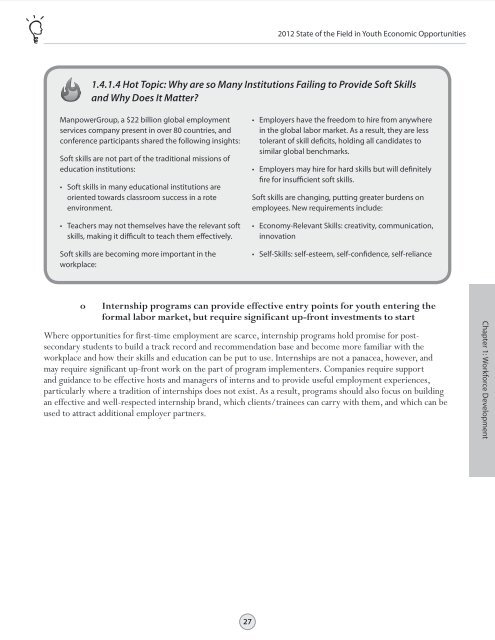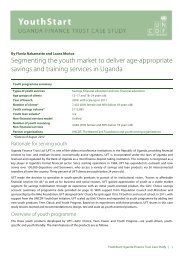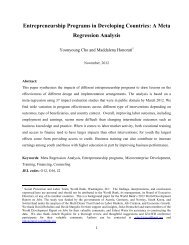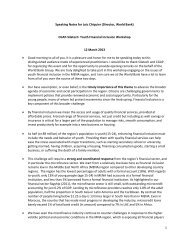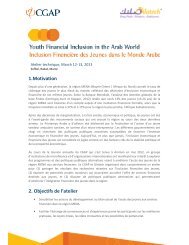STATE OF THE FIELD IN YOUTH ECONOMIC OPPORTUNITIES
STATE OF THE FIELD IN YOUTH ECONOMIC OPPORTUNITIES
STATE OF THE FIELD IN YOUTH ECONOMIC OPPORTUNITIES
You also want an ePaper? Increase the reach of your titles
YUMPU automatically turns print PDFs into web optimized ePapers that Google loves.
Table of Contents<br />
Chapter 1 Chapter 2 Chapter 3 Chapter 4 Chapter 5 Chapter 6 Chapter 7 Chapter 8<br />
Chapter 9<br />
Chapter 10 Chapter 11 Chapter 12 Chapter 13 Chapter 14 Chapter 15 Annexes<br />
2012 State of the Field in Youth Economic Opportunities<br />
1.4.1.4 Hot Topic: Why are so Many Institutions Failing to Provide Soft Skills<br />
and Why Does It Matter<br />
ManpowerGroup, a $22 billion global employment<br />
services company present in over 80 countries, and<br />
conference participants shared the following insights:<br />
Soft skills are not part of the traditional missions of<br />
education institutions:<br />
• Soft skills in many educational institutions are<br />
oriented towards classroom success in a rote<br />
environment.<br />
• Teachers may not themselves have the relevant soft<br />
skills, making it difficult to teach them effectively.<br />
• Employers have the freedom to hire from anywhere<br />
in the global labor market. As a result, they are less<br />
tolerant of skill deficits, holding all candidates to<br />
similar global benchmarks.<br />
• Employers may hire for hard skills but will definitely<br />
fire for insufficient soft skills.<br />
Soft skills are changing, putting greater burdens on<br />
employees. New requirements include:<br />
• Economy-Relevant Skills: creativity, communication,<br />
innovation<br />
Soft skills are becoming more important in the<br />
workplace:<br />
• Self-Skills: self-esteem, self-confidence, self-reliance<br />
o<br />
Internship programs can provide effective entry points for youth entering the<br />
formal labor market, but require significant up-front investments to start<br />
Where opportunities for first-time employment are scarce, internship programs hold promise for postsecondary<br />
students to build a track record and recommendation base and become more familiar with the<br />
workplace and how their skills and education can be put to use. Internships are not a panacea, however, and<br />
may require significant up-front work on the part of program implementers. Companies require support<br />
and guidance to be effective hosts and managers of interns and to provide useful employment experiences,<br />
particularly where a tradition of internships does not exist. As a result, programs should also focus on building<br />
an effective and well-respected internship brand, which clients/trainees can carry with them, and which can be<br />
used to attract additional employer partners.<br />
Chapter 1: Workforce Development<br />
27


